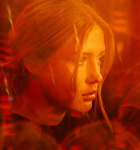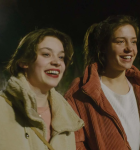On the occasion of the release of Rien à Foutre, meeting with Adèle Exarchopoulos, an anti-star in burgundy Nike jogging accompanied by her couple of directors, Julie Lecoustre and Emmanuel Marre.
To what extent did you recognize yourself in the character of Cassandra?
Adèle Exarchopoulos – In a form of disenchantment with the fact that today everything is consumed very quickly, whether it is physical, feelings, work. We let ourselves go less, we look less for the meaning of things, it’s very chaotic. In Cassandra’s disenchantment and despite her desire for life following a bereavement, I was able to recognize my generation.
How did this filming, carried out almost in a hurry in the middle of Covid, go?
A.E. – For me, who is not very academic, the aviation probation was difficult, having to smoke in the toilets, eat the food from the plane. I was afraid that I would not pass the moment of the security demo. We didn’t really have filming authorization in the airports and stopovers we were going through, I sometimes had to change in the toilet between scenes. But even in difficult times we laughed, it was really a common adventure.
Julie Lecoustre – We shot both in very standardized framed places such as airports and planes. For the extras, we had offered a free round trip Paris/Barcelona to people. So they were real passengers in full flight.
Emmanuel Marre – In Dubai, we shot without authorization. Adele changed in airport toilets between shots sometimes to make plans in the middle of people. The party scenes are also very realistic. It creates an energy of acting that is not tenable throughout the film but which recalls at certain moments the necessary urgency of the state of play, which we find in real life.
This title Rien à Foutre, does it have to do with an anarchic gesture?
E.M. – For us, it has to do with freedom of expression. There is a total privatization of public space, through brands, advertising, sometimes architecture. If you start asking for permissions, you hardly have the right to film people’s lives anymore, or only from one angle. However, it must be remembered that freedom of expression gives us the right to legally film a brand, as long as it is not denigrated. In Dubai, we shot with a small camera, but there the bloggers or influencers were four times more professional than us! They had an impossible gear. He should therefore have no problem shooting with the means of the cinema.
In the film, Cassandra’s body is constantly checked, to conform to her job in the company. Would you draw a parallel with the place of women’s bodies in society today?
A.E. – Beyond the body, which I was not necessarily aware of, it was more the work on a form of mask that interested me. When we met flight attendants with Emmanuel and Julie, what came up a lot was the outfit, the diction, the posture, the make-up, the costume which becomes almost political. When you’re in the air as a passenger, you’re not really aware of it, but when it’s your job, to be in the air disconnected from reality and no longer have a hold on your present, and to have to often reassuring half of the passengers who are often very anxious since we still have a chance of dying, it is more the question of the mask that is essential. It’s something I can also feel with a smaller measure on sale, but not so much considering how I came dressed today! But here it is, it is true that we are constantly asked for a posture. Me, it’s going to bother me more in what I’m sometimes asked to answer in an interview than on a red carpet where it’s fun to play the game, I completely manage to have some distance with that. When I look at a Zendaya or a Jane Campion, they play along too. This mask still makes us look at each other without really asking ourselves what we are going through.
J.L. – Among air hostesses, the sexualization of the body is very marked. The uniforms, particularly in the low-cost companies, are super tight, they have to wear a certain shade of lipstick coordinated with the color of the nails, they have hairstyles, regulation earrings. There is a whole imagination around the air hostess, and at the same time it was also for us to show that in the character of Cassandre there is this duality of the mask as Adèle said, of the armor almost . We also see this implicitly, because apart from her job Cassandre does not wear makeup, appearance is not at all an immediate issue in her relationship with others. We worked with the costume designer on things that were quite vague, quite large outside of the hostess outfit. He is a character who has a sexuality but who we decided not to sexualize.
E.M. – In her personal life, Cassandre has freedom with her body. When she doesn’t want to wax, she doesn’t wax. But in the company, there, there is real violence. Our idea was to show that the uniform is violence. The real violence is when she goes to the job interview and is asked at the end what her reaction should be if a passenger behaves inappropriately. She knows that you should never say no, it’s almost like prostitution. That is a violence a thousand times greater than the question of representation.
The film is ultra-realistic. How much improvisation?
A.E. – The job interview was written and the narrative arcs too of course but everything else is improvisation. What I can say is the first time my parents have liked a movie I’m in and are proud of me. But there are as many things about me as there are not in Cassandra.
The end of the film switches to a somewhat difficult return to the family in a small town near Liège. Would you say that one of the common threads of the film is also the difficulty of attachment to others today?
E.M. – Cassandra’s attachment disorder is the heart of the film. This is what we discovered while making the film. What are we attached to? To his work, to his friends? The film explores places of attachment and detachment too. Cassandre must relearn how to attach herself. The return home is also a common place in cinema, in a place where we did not know if Cassandre was right to return or not. At the same time she finds something but when she comes back to it she discovers that she does not necessarily belong there. But in the world of airports that we describe, where everything is a bit of a non-place, it was important to echo a “super-place” that only those who live there know. The attachment is very strong between the father and his daughters, when he speaks to them about their birth it brings out something fundamental, it is what attaches us fundamentally.
In the film, Cassandre is very taken by social networks. What role do they play in your life Adele?
A.E. – I would be a huge liar to tell you that they have no role for me. Despite everything, it’s a game we’ve all fallen into either out of unhealthy curiosity or political conscience, there are a thousand reasons and I don’t even know if there are good ones or not. I practice the networks but it really scares me for my child, the fact of spying on people’s lives and thinking that it comes down to these beautiful moments on Instagram. I use it a lot for work and it has very good sides, freedom of speech, expression, images. To speak concretely, the images of the death of George Floyd have made police violence undeniable. There was no longer any doubt. Networks are therefore sometimes essential, but it is also a little destructive on private lives on a daily basis because it remains an illusion. I manage to have some distance because I am self-deprecating, but half of the photos I post where I am obviously made up, retouched, dressed in outfits that do not belong to me, I am well aware that I am in my bed awful and exhausted when I post them! It makes me laugh as much as it worries me.
You were born in the cinema in the film by Abdellatif Kechiche. Can we see a common thread between your character in La vie d’Adèle and that of Cassandre in Rien à Foutre?
A.E. – Adèle’s life is about discovering the first times, there is disenchantment but also an enormous attachment. When you love for the first time you really believe that you are going to die. The link I would make between the two films is the space of freedom on set. I had not experienced such freedom since the experience of La vie d’Adèle, thanks to this strength that Emmanuel and Julie have to put us in completely real conditions. Of course there was a script but they were only afraid that it would be fixed, conventional, they wanted to reinvent the script during filming.
How do you choose your roles Adele?
A.E. – There are no criteria but sometimes desires. For example the desire to make a comedy but it is rarely at these times that it falls. For me the choice is very instinctive. It is linked to a meeting, a reading. Choosing a film is a bit like a love story, I want to be part of the adventure. It may be an encounter with a role, a filmmaker, a scenario. To be honest, the few times I wanted to be strategic I very quickly regretted it. To be in the right place, you have to listen to yourself.
Did filming with a male-female director couple bring a form of equality to the set?
A.E. – There is never a complete tie on a set. Julie and Emmanuel are two very different animals even if their sensitivity is the same. It was the first time I worked with a duo, I loved it. But the real subject of the film is the question of the masks that we wear without knowing what the people behind them are really going through.










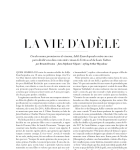



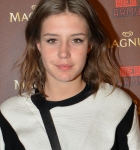

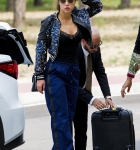
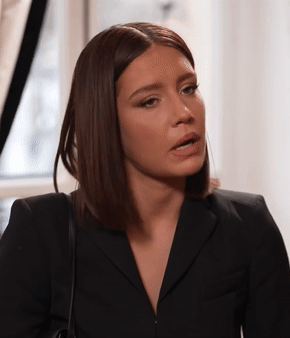

 PLANÈTE B
PLANÈTE B NOUVEAUX RICHES
NOUVEAUX RICHES VOLEUSES
VOLEUSES LE RÈGNE ANIMAL
LE RÈGNE ANIMAL UN MÉTIER SÉRIEUX
UN MÉTIER SÉRIEUX PASSAGES
PASSAGES ÉLÉMENTAIRE
ÉLÉMENTAIRE YVES SAINT-LAURENT
YVES SAINT-LAURENT JE VERRAI TOUJOURS VOS VISAGES
JE VERRAI TOUJOURS VOS VISAGES LOL: QUI RIT, SORT (Season 3)
LOL: QUI RIT, SORT (Season 3) BULGARI
BULGARI








